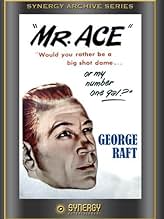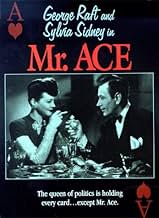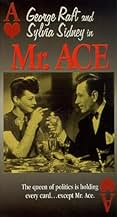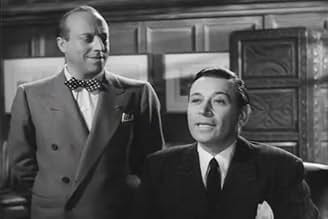AVALIAÇÃO DA IMDb
6,0/10
243
SUA AVALIAÇÃO
Adicionar um enredo no seu idiomaA rich society woman uses a gangster to win a congressional election.A rich society woman uses a gangster to win a congressional election.A rich society woman uses a gangster to win a congressional election.
Joyce Bryant
- Nightclub Singer
- (as Joyce Bryant and the Flennoy Trio)
Stanley Andrews
- Tomahawk Club Boss
- (não creditado)
Walter Baldwin
- Bookie - Party Guest
- (não creditado)
Brooks Benedict
- Man Entering Elevator
- (não creditado)
Truman Bradley
- Radio Forum Moderator
- (não creditado)
Gordon B. Clarke
- Nightclub Pianist
- (não creditado)
James Conaty
- Party Guest
- (não creditado)
Lester Dorr
- Reporter at Party
- (não creditado)
Ben Erway
- Tomahawk Club Politico
- (não creditado)
Mary Field
- Lady with Question on Radio Forum
- (não creditado)
Avaliações em destaque
Sylvia Sidney is a wealthy woman who wants to be governor in "Mr. Ace" from 1946, also starring George Raft, with Stanley Ridges, and Jerome Cowan.
In order to have a chance at winning, Margaret (Sidney) has to get the backing of Eddie Ace, a political boss. Eddie doesn't want to endorse her. For one thing, he seems to have fallen for her; for another, she's an independent thinker, and he senses she won't follow instructions.
It's always fun to see a younger Sylvia Sidney. Here, with her hairdo and suit, she reminds me a little of Bette Davis. She gives a very good performance. Raft is his usual tough guy self.
The attitude toward women in politics in this film is interesting. It was a little more unusual back then that it is now, though there were some formidable women in the game, including Melvyn Douglas' wife Helen Gahagan Douglas, Nellie Taylor Ross, governor of Wyoming, and Miriam Ferguson in Texas. It's mentioned in the film that 29 members of the House of Representatives up to that time were women.
It's an okay watch.
In order to have a chance at winning, Margaret (Sidney) has to get the backing of Eddie Ace, a political boss. Eddie doesn't want to endorse her. For one thing, he seems to have fallen for her; for another, she's an independent thinker, and he senses she won't follow instructions.
It's always fun to see a younger Sylvia Sidney. Here, with her hairdo and suit, she reminds me a little of Bette Davis. She gives a very good performance. Raft is his usual tough guy self.
The attitude toward women in politics in this film is interesting. It was a little more unusual back then that it is now, though there were some formidable women in the game, including Melvyn Douglas' wife Helen Gahagan Douglas, Nellie Taylor Ross, governor of Wyoming, and Miriam Ferguson in Texas. It's mentioned in the film that 29 members of the House of Representatives up to that time were women.
It's an okay watch.
Women in politics weren't common in 1947 when this came out. Therefore, this was a surprisingly straight forward look at the theme with an ambitious socialite who's no sweet "goody goody". I do agree with the reviewer who would have liked more emphasis on Sylvia Sidney and her campaign and less on George Raft and the inevitable romance.
And so this is disappointingly mediocre, not going where it could have gone. Even so, it's an interesting film to watch, especially in this age. And actually, I believe that it stands as a better "woman in politics" movie than most with the theme. Don't expect a gangster movie although Raft naturally is close to being one in this.
And so this is disappointingly mediocre, not going where it could have gone. Even so, it's an interesting film to watch, especially in this age. And actually, I believe that it stands as a better "woman in politics" movie than most with the theme. Don't expect a gangster movie although Raft naturally is close to being one in this.
10ROCKY-19
This is an undervalued little political drama from an era when politics on the big screen suddenly became popular. While so many such films are based on saccharine preaching or play cute with the "women in politics" theme, there's not an ounce of sugar here.
Ambitious socialite congresswoman Margaret Chase (Sylvia Sidney) seeks the governor's office, and knows exactly how to use the crooked political system (and even her estranged husband) to get there. One thing she needs is the endorsement of the nefarious Tomahawk Club and its top dog, Mr. Ace (George Raft). Like any seasoned politician with more aspirations than ethics, she has no qualms with buddying up to the shady characters. Ace toys with her but is not one to be manipulated. Watch him watch her as he introduces her to his "friends" as if waiting for her to exhibit the same hypocritical benevolence of any male politician trying to curry favor - and she does. The passionate moral compass of the story is her former professor, Joshua Adams, who (for reasons that differ from Ace's) does not want her to be governor. There is a portrait of modern politics as Margaret believes she and Adams are manipulating Ace when in fact Ace and Adams are conspiring against her.
The script by Fred Finklehoff shows great restraint. We get only as much backstory as we absolutely need. The people are human; nobody is an innocent angel and no political bad guy is cackling into his cloak. As in real politics, everyone is trying to manipulate everyone else. Even in "romancing" each other, Margaret Chase and Eddie Ace are actually testing each other's political wills. No hearts and flowers here. This is a romance of black coffee and hard-boiled eggs.
And how refreshing to see actors of a "certain age" actually acting their ages. Sidney is a mature, dynamic woman, and gets to play one. Being attracted to Mr. Ace does not turn Margaret into a brainless flit, nor does Ace let the attraction drown his cynicism. She's more than willing to use backhanded tactics to get around him politically, and he responds by turning the system against her. Only then does she have a change of heart about the entire campaign. And only her obvious change of heart allows Ace to rethink his own motives.
Take note of Roman Bohnen as Prof. Adams. Amid all the professional politicians and their cold-blooded calculations he is the emotional voice of infuriated idealism. This same year ('46) Bohnen also appeared in the brilliant "The Best Years of Our Lives" as a completely different sort of character (Dana Andrews' soft-spoken, alcoholic father). He's simply remarkable.
"Mr. Ace" was the third of a trilogy of films Raft and Sidney did together. "Pick-Up" brought them together in the early '30s, "You and Me" in the late '30s, and then "Mr. Ace." Their natural chemistry ages like fine wine.
Ambitious socialite congresswoman Margaret Chase (Sylvia Sidney) seeks the governor's office, and knows exactly how to use the crooked political system (and even her estranged husband) to get there. One thing she needs is the endorsement of the nefarious Tomahawk Club and its top dog, Mr. Ace (George Raft). Like any seasoned politician with more aspirations than ethics, she has no qualms with buddying up to the shady characters. Ace toys with her but is not one to be manipulated. Watch him watch her as he introduces her to his "friends" as if waiting for her to exhibit the same hypocritical benevolence of any male politician trying to curry favor - and she does. The passionate moral compass of the story is her former professor, Joshua Adams, who (for reasons that differ from Ace's) does not want her to be governor. There is a portrait of modern politics as Margaret believes she and Adams are manipulating Ace when in fact Ace and Adams are conspiring against her.
The script by Fred Finklehoff shows great restraint. We get only as much backstory as we absolutely need. The people are human; nobody is an innocent angel and no political bad guy is cackling into his cloak. As in real politics, everyone is trying to manipulate everyone else. Even in "romancing" each other, Margaret Chase and Eddie Ace are actually testing each other's political wills. No hearts and flowers here. This is a romance of black coffee and hard-boiled eggs.
And how refreshing to see actors of a "certain age" actually acting their ages. Sidney is a mature, dynamic woman, and gets to play one. Being attracted to Mr. Ace does not turn Margaret into a brainless flit, nor does Ace let the attraction drown his cynicism. She's more than willing to use backhanded tactics to get around him politically, and he responds by turning the system against her. Only then does she have a change of heart about the entire campaign. And only her obvious change of heart allows Ace to rethink his own motives.
Take note of Roman Bohnen as Prof. Adams. Amid all the professional politicians and their cold-blooded calculations he is the emotional voice of infuriated idealism. This same year ('46) Bohnen also appeared in the brilliant "The Best Years of Our Lives" as a completely different sort of character (Dana Andrews' soft-spoken, alcoholic father). He's simply remarkable.
"Mr. Ace" was the third of a trilogy of films Raft and Sidney did together. "Pick-Up" brought them together in the early '30s, "You and Me" in the late '30s, and then "Mr. Ace." Their natural chemistry ages like fine wine.
This film's makers probably were aiming at a kind of political satire that Capra and Sturges sometimes brought off, but a lack of focus and fear of breaching the production code resulted in a script that lurches one way and then another.
Sylvia Sidney is excellent as a female politician, back when such things were rare, doing her best to conceal her ambition and ruthlessness behind an attractive demeanor with a fixed smile. The script doesn't quite know what to make of her. At first she seems not only wholly self-centered but frigid, having driven her husband, whom she married for his wealth and position, into the arms of other women without her much caring about it. Later she becomes more sympathetic for not being corrupt like most of the other pols around her, and for having to walk a fine line between being ladylike and being "one of the boys."
George Raft is his usual stoic self as a hard-bitten political with hinted-at mob connections whose only ideology is winning and graft (or G. Raft).
Sidney's idea is to lure him away from the machine candidate to back her. In one scene she inveigles him into spending the night at her place with apparent intentions of seducing him, but then the movie gets cold feet and the scene fizzles out, as do many others.
Still the film addresses, albeit timidly, political corruption and the ease with which the masses can be manipulated, and also reminds us of the pervasive sexism of that era. Sidney is repeatedly told "you're too attractive to run for office." Was ugliness considered a necessary attribute of female politicians in those days?
As you'd expect, some romantic sparks eventually fly between the two co-stars en route to its wildly implausible ending.
Good cinematography and some lavish interior decoration. If you're the type who enjoys watching old films for a window into the political atmosphere of their times, this is for you.
Sylvia Sidney is excellent as a female politician, back when such things were rare, doing her best to conceal her ambition and ruthlessness behind an attractive demeanor with a fixed smile. The script doesn't quite know what to make of her. At first she seems not only wholly self-centered but frigid, having driven her husband, whom she married for his wealth and position, into the arms of other women without her much caring about it. Later she becomes more sympathetic for not being corrupt like most of the other pols around her, and for having to walk a fine line between being ladylike and being "one of the boys."
George Raft is his usual stoic self as a hard-bitten political with hinted-at mob connections whose only ideology is winning and graft (or G. Raft).
Sidney's idea is to lure him away from the machine candidate to back her. In one scene she inveigles him into spending the night at her place with apparent intentions of seducing him, but then the movie gets cold feet and the scene fizzles out, as do many others.
Still the film addresses, albeit timidly, political corruption and the ease with which the masses can be manipulated, and also reminds us of the pervasive sexism of that era. Sidney is repeatedly told "you're too attractive to run for office." Was ugliness considered a necessary attribute of female politicians in those days?
As you'd expect, some romantic sparks eventually fly between the two co-stars en route to its wildly implausible ending.
Good cinematography and some lavish interior decoration. If you're the type who enjoys watching old films for a window into the political atmosphere of their times, this is for you.
Although George Raft plays the title role in Mr. Ace, the film such as it is really belongs to Sylvia Sidney as the ambitious Congresswoman who wants to become her state's first female governor. The Mr. Ace of the title is Eddie Ace, noted political boss in the state whose backing Sidney wants.
In fact two female governors had already been elected in the USA at the point in time Mr. Ace was made, Nellie Tayloe Ross in Wyoming and Miriam Ferguson in Texas. The script makes reference to both these ladies and to the 29 members of the House of Representatives that had been elected up to that point. It had been done before, but it was still a relatively new phenomenon.
For a smart political boss Raft sure gets his hormones involved in his decision making. His problem with Sidney is that she's tough and independent minded and won't take his orders or anything else from him. Raft's decision making is not coming from his head, that's for sure.
Sidney is also fighting an attraction to Raft as well even though she's married to Alan Edwards albeit they are estranged and do divorce during the film.
There's a whole lot of maneuvering done and at times it's more hormone driven than politically driven. These are supposed to be professional people you know.
Roman Bohnen plays Sidney's former political science professor and mentor in her younger days. He still appeals to the better angels of her nature. Sidney has two political operatives in Jerome Cowan and Sara Haden who do her bidding. Watch Haden's performance, a very understated one with definite lesbian undertones.
Sid Silvers is Raft's factotum and Stanley Ridges his rival within his own organization who Sidney successfully subverts for a while.
The emphasis of this film should have been on Sidney rather than Raft. Her's is the real story here and Mr. Ace would have been a better film had it been entitled Mrs. Chase.
Sidney's name in the film is Margaret Chase and in 1948 one Margaret Chase Smith won election to the United States Senate to become the first woman elected in her own right to that body without having been appointed by the state governor to fill a vacancy.
Mr. Ace does have its moments and one might want to view it just to see how things have so changed for women in politics.
In fact two female governors had already been elected in the USA at the point in time Mr. Ace was made, Nellie Tayloe Ross in Wyoming and Miriam Ferguson in Texas. The script makes reference to both these ladies and to the 29 members of the House of Representatives that had been elected up to that point. It had been done before, but it was still a relatively new phenomenon.
For a smart political boss Raft sure gets his hormones involved in his decision making. His problem with Sidney is that she's tough and independent minded and won't take his orders or anything else from him. Raft's decision making is not coming from his head, that's for sure.
Sidney is also fighting an attraction to Raft as well even though she's married to Alan Edwards albeit they are estranged and do divorce during the film.
There's a whole lot of maneuvering done and at times it's more hormone driven than politically driven. These are supposed to be professional people you know.
Roman Bohnen plays Sidney's former political science professor and mentor in her younger days. He still appeals to the better angels of her nature. Sidney has two political operatives in Jerome Cowan and Sara Haden who do her bidding. Watch Haden's performance, a very understated one with definite lesbian undertones.
Sid Silvers is Raft's factotum and Stanley Ridges his rival within his own organization who Sidney successfully subverts for a while.
The emphasis of this film should have been on Sidney rather than Raft. Her's is the real story here and Mr. Ace would have been a better film had it been entitled Mrs. Chase.
Sidney's name in the film is Margaret Chase and in 1948 one Margaret Chase Smith won election to the United States Senate to become the first woman elected in her own right to that body without having been appointed by the state governor to fill a vacancy.
Mr. Ace does have its moments and one might want to view it just to see how things have so changed for women in politics.
Você sabia?
- Curiosidades"The Hedda Hopper Show - This Is Hollywood" broadcast a 30 minute radio adaptation of the movie on January 25, 1947 with George Raft and Sylvia Sidney reprising their film roles.
- Citações
Margaret Wyndham Chase: You'll make a very impressive governor's husband, darling.
Principais escolhas
Faça login para avaliar e ver a lista de recomendações personalizadas
Detalhes
- Tempo de duração1 hora 24 minutos
- Cor
- Proporção
- 1.37 : 1
Contribua para esta página
Sugerir uma alteração ou adicionar conteúdo ausente






































